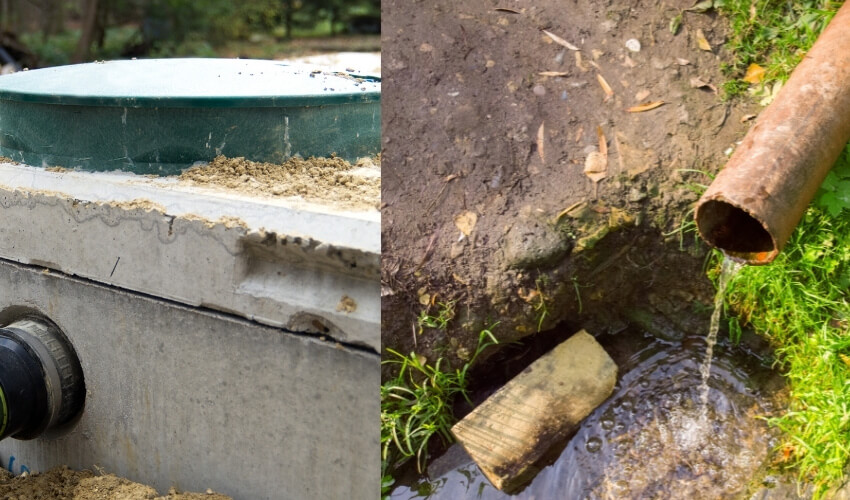Even inside plumbing can freeze when under freezing temperatures. When the temperature drops, you are prone to pipes freezing or

Many people use the words septic system and sewer system interchangeably, but there is actually a big difference between the two.
It’s important to know the difference, especially if you are a homeowner or business owner because each type of system has different maintenance needs.
Here’s a breakdown of the main differences between septic systems and sewer systems.
A septic system is a small-scale sewage treatment system. They are most commonly found in rural areas that are not connected to a central sewage system.
Septic systems are also referred to as onsite wastewater treatment systems (OWTS). OWTS come in many different forms, but they all have one common goal: to treat wastewater from toilets, showers, sinks, and other household plumbing before discharging it back into the environment.
Septic systems work by using bacteria to break down the solid waste in sewage. The sewage enters the septic tank where heavy solids settle to the bottom while lighter solids float to the top.
The middle layer is mostly water that drains through the outlet pipe into the leach field for final treatment.
Bacteria in the tank break down the solid waste, which prevents it from clogging up the leach field.
A sewer system is a network of pipes that carry wastewater from homes, businesses, and industries to treatment plants where it is treated before being discharged into waterways.
Most urban areas are served by a central sewer system while rural areas often have individual septic tanks.
Wastewater enters the sewer system through gravity flow – meaning that it flows downhill towards the treatment plant.
As it flows through the network of pipes, any solids that settle out are removed periodically by cleaning crews.
The remaining water is then treated at a wastewater treatment plant before being discharged into waterways.
Do you have problem with your septic or sewer system? Check out our drain cleaning services.
Many businesses and homeowners are faced with the daunting task of determining whether to connect to a sewer system or install a septic tank. Both come with pros and cons, as well as initial and ongoing costs.
The initial cost of connecting to a sewer system is typically lower than the cost of installing a septic tank. However, this cost can vary depending on the size and location of your property.
Homeowners who live in urban areas may have to pay a higher connection fee because of the proximity to the municipal sewer system.
Businesses that generate large amounts of wastewater may also be required to pay a higher connection fee.
The ongoing costs associated with a sewer connection are typically higher than the costs associated with a septic tank.
This is because businesses and homeowners are responsible for paying their share of the municipal sewer bill, which is usually based on water usage. In addition, businesses may also be required to pay for periodic cleanings of their sewer lines.
Septic tanks require regular maintenance and pumping in order to function properly. The frequency of these activities will depend on the size and usage of your septic tank.
Homeowners who live in rural areas may have to pump their septic tanks more frequently because they generate more wastewater than those who live in urban areas.
Businesses that generate large amounts of wastewater will also have to pump their septic tanks more frequently. Septic tank pumping can be costly, so it's important to factor this into your decision making process.
When it comes to choosing a wastewater treatment system for your home, there are two main options: a septic system or a sewer system.
Both have their own pros and cons, so it's important to do your research to see which one is right for you. Here are some of the key benefits of septic systems:
These are just a few of the benefits of septic systems. If you're considering installing a wastewater treatment system in your home, be sure to weigh all the factors before making your decision.
Does your commercial sewer or septic system has problems? Our commercial service is best for you.
While most people don't think about their sewer or septic system very often, these vital systems require regular maintenance to keep them functioning properly.
Otherwise, you could end up dealing with a nasty backup or overflowing sewage.
If you live in Somerville, the best way to avoid these problems is to call a qualified plumber for help.
Plumbers have the training and experience necessary to maintain your sewer and septic system, and they can also spot potential problems before they become serious.
As a result, calling a plumber for help is always the best course of action when you're having problems with your sewer or septic system.
So, what’s the bottom line? If you live in a rural area, chances are you have a septic system. If you live in an urban area, chances are you have a sewer system.
And if you’re ever unsure, just give your local municipality a call – they will be able to tell you for sure!